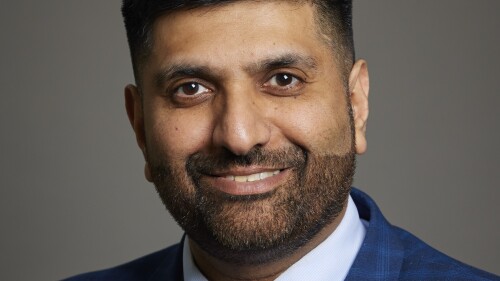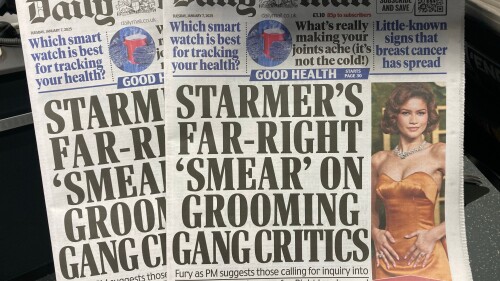The Michaela Academy, a publicly-funded school operated by a private non-profit organization in London, has defeated an extremist-backed legal effort to overturn its ban on prayer rituals on its campus.
[T]eachers must not be threatened into submission
The female Michaela Academy pupil who filed suit against the school was backed by what The Times estimates to be between £100,000 and £150,000 in taxpayer-funded legal-aid money. The suit alleged the school’s ban on prayer rituals was discriminatory, “uniquely” affected her Muslim faith, and was an infringement of her right to freedom of thought, conscience, and religion under the European Convention of Human Rights.
In a written judgment handed down in mid-April, Justice Thomas Linden ruled the prayer ban did not interfere with the pupil’s religious freedom, as she could have moved to another school that allowed prayer at lunchtime. Linden ruled the ban was justified, given the secular ethos of the school. “The disadvantage to Muslim pupils at the school caused by the prayer ritual policy is […] outweighed by the aims which it seeks to promote in the interests of the school community as a whole, including Muslim pupils,” he wrote.
The High Court’s decision was welcomed by Prime Minister Rishi Sunak and Minister for Women and Equalities Kemi Badenoch, who described it in a post on X as a “victory against activists trying to subvert our public institutions.”
Minister Badenoch had stated in her Twitter post, “No pupil has the right to impose their views on an entire school community in this way. The Equality Act is a shield, not a sword[,] and teachers must not be threatened into submission.”
In a statement posted on X, the school’s headmistress, Katharine Birbalsingh, welcomed the court’s decision as “a victory for all schools.” She warned against a false narrative about Muslims being an oppressed minority at Michaela. “They are, in fact, the largest group. Those who are most at risk are other minorities and Muslim children who are less observant. If parents do not like what Michaela is, they do not need to send their children to us.”
Islamist-led advocacy group MEND (Muslim Engagement and Development) condemned the court ruling. Mend, which has a history of backing challenges by a minority of disaffected Muslim parents against the governance of secular state schools in Britain, said in a statement, “The [H]igh [C]ourt verdict is an absolute travesty of justice and all who care about preserving the tolerance and diversity of our multicultural nation should condemn this outcome. The ruling sets a dangerous precedent and could risk encouraging a wave of bans on religious expressionism in schools, and perhaps even beyond into other areas of the public sector.”
The Muslim Vote, a campaign backed by Mend, has since issued a list of 18 demands to Labour leader Keir Starmer if he does not want to lose their vote in the general election due later this year. The demands include a declaration that Muslims will be allowed to pray at school and a call to rescind the definition of extremism that Secretary of State for Levelling Up, Housing and Communities, Michale Gove, introduced into law in March. During his presentation, Gove named MEND as one of three organizations potentially meeting a new extremism definition due to their “Islamist” orientation.
The School
The Michaela Academy, founded in 2014 near Wembley Stadium in the North London borough of Brent, is one of Britain’s approximately 400 “free schools” run independently by non-profit groups that receive funding from government, but operate outside its control. Its board is free to set its own curriculum and rules.
The extraordinary academic progress enabled in a deprived London borough by the “tough love” regime at Michaela under headmistress Katherine Birbalsingh, an Oxford University graduate of Indo-Guyanese-Jamaican heritage, has been the subject of numerous profiles, including a Time magazine article and an ITV documentary.
In his brief on behalf of Michaela, Jason Koppel KC told the High Court that the school aggressively promotes integration, is run with military precision, and uses an “ultra-strict enforcement of prescribed behavioral rules” to achieve its goals. Pupils sing the national anthem daily and offer affirmations of gratitude to parents and teachers. Totemic slogans displayed around the school include “Knowledge is Power” and “Do Your Duty.” Muslim pupils make up 50 percent of the school’s 700 students.
The Controversy
The school introduced a ban on ritualized prayer in March 2023 after 30 Muslim pupils started praying on blazers in the playground, pressuring others to join them and adopt symbols of piety such as the hijab. The pro-Taliban, pro-Hamas news site 5Pillars reported on the ban in a since-deleted article published under the headline “Michaela Community School in Wembley Preventing Muslims from Praying.” 5Pillars broadcast unsubstantiated allegations by the unnamed child that a teacher had been verbally abusive to pupils when preventing them from praying and promoted a now-deleted petition on Change.org to draw attention to the controversy.
In its brief to the High Court, the school reported that in the weeks after the suit against it was filed, the academy was targeted with “threats of violence,” abuse, “false” allegations of Islamophobia, and a “bomb hoax.”
The ruling is a clear defeat for MEND, which had claimed victory in 2018 when the headmistress of St. Stephen’s Primary School in Newham, another high-performing state school, reversed a ban on hijabs for girls under the age of eight. The reversal came after an online petition publicized on 5 Pillars and The Islam Channel, gathered 20,000 signatures. Neena Lall, the British Sikh headmistress of the school, was bombarded with 500 emails a day, slurred online as a “paedophile” and “racist bigot” and compared in a video to Adolf Hitler.
In a visit to the school before the court handed down its decision, Focus on Western Islamism (FWI), found no signs of anger or militancy among pupils and parents about the prayer ban before the High Court verdict was delivered. One pupil filing out of school in January told FWI that “No one really talks about [the case] at school” and another said, it is “not a huge deal.”
A Muslim father waiting outside the school gates, who spoke faltering English, told FWI he thought the school behavior policies were “too strict,” almost like in the military. Nevertheless, he could not fault the education. His daughter, who was about to graduate, had had offers from four Russell Group universities and one in Canada. He said he had seen the petition against the prayer ban on Change.org but did not sign it, as he was a parent at the school. He said of Birbalsingh, “I believe in karma, and if she is doing the right thing then, she will get the right outcome at the High Court.”
Alka Sehgal-Cuthbert, a former teacher and founder of Don’t Divide Us, a charity that challenges authoritarian and polarizing anti-racism narratives, told FWI the recent attacks on Michaela and Barclay Primary School — another school in Newham which had to close early before Christmas amid threats against staff after it required pupils to leave pro-Palestine insignias and flags at home – are “a political attempt by Islamist activists, to rule the roost, to change the norms of particular schools.”
“The pupil bringing this high court case against Michaela and her supporters are saying ‘How can I leave my religion behind when I come into school? You’re asking an unjustifiable price for me to pay.’ Well, first of all, that’s a very false idea of identity. People have lots of things that influence their identity. Somebody who has just a religious identity and nothing else is basically a zealot. And there’s no way we should be organizing our institutions around zealotry.”
Hopefully, the High Court’s verdict in favor of the Michaela School, which clearly provides its students with a path to success in British society, represents a growing awareness of — and opposition to — Islamist efforts to undermine the constitutional and social order of Western democracies.
Hannah Baldock is a U.K.-based researcher on radicalization and terrorism.









